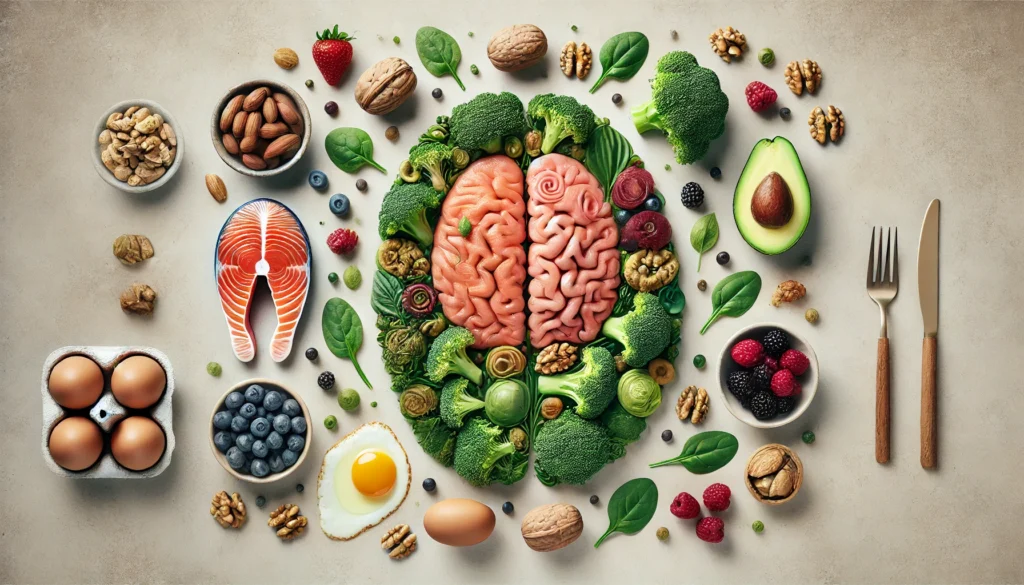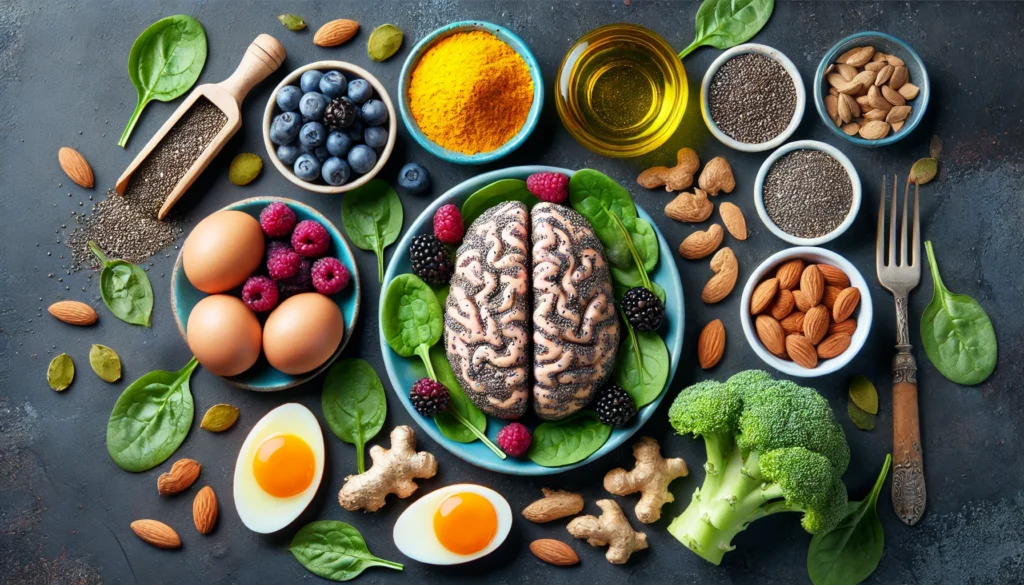In an age of constant stimulation, multitasking, and high cognitive demand, the clarity of our thinking has never been more vital. From students navigating complex material to professionals making fast-paced decisions, our brains are under relentless pressure. Mental fog—or what is commonly referred to as brain fog—can dull our sharpness, hinder productivity, and diminish quality of life. While brain fog can stem from various causes such as stress, lack of sleep, hormonal imbalances, and even certain medical conditions, one of the most powerful levers we have for combating it lies in our diet. A growing body of evidence reveals that the foods we consume directly influence our cognitive clarity. Understanding the intricate relationship between diet and mental function enables us to create an informed and effective brain fog diet that truly supports optimal brain performance.
You may also like: Best Brain Foods for Focus, Memory, and Longevity: What Science Says
Defining Brain Fog: What It Is and Why It Happens
Brain fog is not a medically recognized diagnosis, but it is a term widely used to describe a constellation of symptoms such as forgetfulness, lack of focus, mental fatigue, confusion, and difficulty processing information. Often likened to a cloud that settles over your thoughts, brain fog can be transient or chronic, and its severity varies greatly among individuals. It may result from inadequate sleep, high stress levels, nutritional deficiencies, or chronic inflammation, among other underlying causes. Importantly, research shows that what we eat can either exacerbate or alleviate these symptoms. Nutrient-poor diets high in sugar, refined carbohydrates, and trans fats have been shown to impair memory and concentration, while nutrient-dense, anti-inflammatory diets are associated with enhanced cognitive performance. Thus, identifying foods for brain fog becomes a practical and evidence-based step toward reclaiming mental clarity.
The Role of Nutrition in Cognitive Function
The brain, although comprising only about 2% of body weight, consumes more than 20% of the body’s energy resources. This energy primarily comes from glucose, but the way this glucose is metabolized—and the supporting micronutrients involved in neurotransmitter synthesis, synaptic plasticity, and neurogenesis—depends heavily on dietary intake. Diets lacking in essential nutrients such as omega-3 fatty acids, B-vitamins, antioxidants, magnesium, and amino acids can disrupt these vital processes, leading to a decline in mental performance. Emerging studies in nutritional neuroscience emphasize the importance of dietary patterns over isolated nutrients, suggesting that a comprehensive brain fog diet may offer a sustainable route to cognitive clarity. Indeed, diets modeled on traditional Mediterranean, MIND, and anti-inflammatory principles have been consistently linked to better memory, faster processing speed, and reduced risk of cognitive decline.
Omega-3 Fatty Acids: Essential Brain Builders
When evaluating foods that help with brain fog, omega-3 fatty acids often take center stage. Found abundantly in fatty fish such as salmon, mackerel, and sardines, these polyunsaturated fats are crucial for maintaining neuronal membrane fluidity, enhancing signal transduction, and reducing inflammation in the brain. Docosahexaenoic acid (DHA), one of the primary omega-3s found in fish oil, is a structural component of the brain and retina, underscoring its importance in visual and cognitive health. Clinical studies have linked low omega-3 levels with symptoms of brain fog, including memory lapses and difficulty concentrating. Supplementation and dietary inclusion of omega-3-rich foods have been shown to improve working memory, reduce mental fatigue, and support mood regulation. Walnuts, chia seeds, and flaxseeds also offer plant-based alternatives, although their conversion to DHA is limited compared to marine sources.
Antioxidants and Polyphenols: Defenders Against Cognitive Oxidative Stress
Oxidative stress, caused by an imbalance between free radicals and the body’s antioxidant defenses, plays a pivotal role in cognitive aging and neuroinflammation. Antioxidant-rich foods are thus integral to any brain fog diet. Berries—especially blueberries, strawberries, and blackberries—are potent sources of anthocyanins, a class of polyphenols shown to cross the blood-brain barrier and exert neuroprotective effects. Studies demonstrate that regular berry consumption is associated with improved memory and executive function in both older adults and younger populations. Dark chocolate, green tea, turmeric, and colorful vegetables such as kale, spinach, and red cabbage also provide a rich array of polyphenols and flavonoids that protect neurons, support synaptic plasticity, and enhance cerebral blood flow. Incorporating these foods into the daily diet offers a flavorful and evidence-supported way to fight brain fog.

B-Vitamins and Mental Clarity: Methylation, Mood, and Memory
B-vitamins—particularly B6, B9 (folate), and B12—are indispensable for brain health. These vitamins play key roles in homocysteine metabolism, neurotransmitter synthesis, and DNA methylation, all of which impact cognitive function. Deficiencies in B-vitamins are frequently observed in individuals experiencing fatigue, confusion, irritability, and memory problems—classic symptoms of brain fog. Folate-rich foods such as leafy greens, legumes, and avocados, along with B12-containing sources like eggs, dairy, and fortified cereals, are among the best foods for brain fog when consumed consistently. Importantly, the aging population and individuals following plant-based diets are at higher risk for B12 deficiency, underscoring the need for mindful dietary planning or supplementation under professional guidance. By supporting neuronal integrity and efficient energy metabolism, B-vitamins are foundational elements of a functional brain fog diet.
Complex Carbohydrates and Stable Glucose: The Brain’s Preferred Fuel
One of the more overlooked aspects of mental clarity is blood sugar regulation. The brain relies on a steady supply of glucose, but not all carbohydrates deliver this energy source in the same way. Refined carbohydrates cause rapid spikes and subsequent crashes in blood sugar, often resulting in mental fogginess, fatigue, and irritability. On the other hand, complex carbohydrates such as oats, quinoa, sweet potatoes, and legumes provide a slow and sustained release of glucose that promotes consistent cognitive performance. These foods also contain fiber, which supports gut health—a factor increasingly linked to brain function. Including complex carbohydrates in a brain fog diet helps stabilize mood, reduce energy dips, and ensure that the brain receives the fuel it needs without metabolic chaos.
Protein and Amino Acids: Building Blocks of Neurotransmitters
Proteins are not just for muscle maintenance; they are critical for brain health. The amino acids found in protein-rich foods serve as precursors to neurotransmitters such as dopamine, serotonin, and acetylcholine, all of which regulate mood, attention, and memory. Tryptophan, for instance, is converted into serotonin and is found in turkey, eggs, nuts, and seeds. Tyrosine supports dopamine production and is abundant in dairy, soy, and legumes. A lack of adequate protein can impair neurotransmitter balance and contribute to symptoms often described as brain fog. By ensuring adequate intake of high-quality proteins—whether from animal or plant sources—we nourish the biochemical pathways that sustain alertness and mental clarity.
Hydration and Electrolytes: A Clear Mind Needs Fluid Balance
Dehydration is one of the simplest yet most underestimated causes of cognitive impairment. Even mild dehydration can negatively impact concentration, short-term memory, and mood. Proper hydration supports the delivery of nutrients and oxygen to the brain and aids in the removal of metabolic waste. Water, of course, is the foundation, but fluids from herbal teas, broth-based soups, and water-rich fruits like cucumbers and watermelon also contribute to total hydration. Electrolytes such as sodium, potassium, and magnesium are equally important in maintaining nerve transmission and fluid balance. Including coconut water, leafy greens, and bananas in the brain fog diet can help maintain this equilibrium. A well-hydrated brain is better equipped to stay sharp and resilient throughout the day.
The Gut-Brain Axis: How Microbiota Influence Cognitive Clarity
The connection between gut health and brain function has emerged as one of the most compelling areas in modern neuroscience. The gut-brain axis—a bidirectional communication network between the gastrointestinal system and the central nervous system—is largely mediated by the gut microbiota. These microorganisms influence brain chemistry through the production of neurotransmitters, short-chain fatty acids, and inflammatory mediators. Dysbiosis, or microbial imbalance, has been associated with anxiety, depression, and cognitive fog. Fermented foods such as yogurt, kefir, kimchi, and sauerkraut introduce beneficial bacteria that support microbial diversity. Prebiotic fibers found in garlic, onions, asparagus, and oats nourish these microbes, further enhancing gut health. By integrating these microbiota-supportive foods into a brain fog diet, we create a foundational layer of support for mental clarity.
Caffeine, Adaptogens, and Cognitive Modulation
Certain natural substances have been shown to modulate cognitive function through their stimulant or adaptogenic properties. Caffeine, found in coffee and green tea, enhances alertness, reaction time, and mood by blocking adenosine receptors and stimulating dopamine release. However, excessive caffeine or consumption later in the day can disrupt sleep, exacerbating brain fog the following morning. Adaptogens such as rhodiola, ashwagandha, and ginseng help the body adapt to stress and improve mental resilience. When used judiciously, these substances can provide acute cognitive benefits without the drawbacks of over-stimulation. Including moderate amounts of coffee or green tea alongside adaptogenic herbs offers a balanced approach to enhancing focus and managing fatigue.
Avoiding Cognitive Saboteurs: Foods That Worsen Brain Fog
Just as some foods can sharpen the mind, others can cloud it. Diets high in refined sugar, trans fats, artificial additives, and ultra-processed foods have been linked to systemic inflammation, insulin resistance, and oxidative stress—all of which impair brain function. Regular consumption of sugary snacks, fried foods, and packaged meals may disrupt the delicate balance of neurotransmitters and promote cognitive fatigue. Moreover, food intolerances and sensitivities—particularly to gluten, dairy, or histamines—can trigger inflammatory responses that present as brain fog. Eliminating or minimizing these culprits while emphasizing whole, unprocessed foods can be a transformative step in regaining cognitive vitality.

Frequently Asked Questions (FAQ): Foods and Strategies for Overcoming Brain Fog
1. Can eating patterns throughout the day impact brain fog even if you’re eating the right foods?
Yes, the timing and consistency of meals significantly influence mental clarity. Even the best foods for brain fog can lose their effectiveness if consumed in a way that disrupts blood sugar stability. Skipping meals or eating irregularly can lead to dips in glucose availability, leaving the brain underpowered. A structured eating schedule that includes protein-rich breakfasts and balanced meals every four to five hours helps sustain energy levels and cognitive function. To maximize the benefits of a brain fog diet, it’s crucial to combine the right foods with strategic meal timing.
2. Are there any overlooked micronutrients that play a subtle but important role in reducing brain fog?
Absolutely. While major players like B-vitamins and omega-3s receive attention, lesser-known micronutrients such as choline, zinc, and selenium are also critical. Choline, found in eggs and liver, is essential for acetylcholine synthesis, a neurotransmitter involved in memory and learning. Zinc and selenium, present in pumpkin seeds and Brazil nuts respectively, support antioxidant defenses and thyroid function—both of which are tightly linked to cognitive clarity. Incorporating these into your selection of foods for brain fog provides an added layer of support for mental sharpness.
3. How can someone customize a brain fog diet based on their unique health conditions or lifestyle?
Personalization is key to success when implementing a brain fog diet. Someone with insulin resistance might prioritize low-glycemic foods, while a vegan will need to focus on plant-based sources of omega-3s and B12. Athletes may require higher protein and electrolyte intake to match their cognitive and physical demands. In any case, the best foods for brain fog should align with one’s medical history, dietary preferences, and energy expenditure. A registered dietitian or functional nutritionist can help fine-tune these strategies to ensure optimal outcomes.
4. What role does intermittent fasting play in mental clarity and brain fog management?
Intermittent fasting has gained traction for its potential cognitive benefits, including enhanced focus and reduced brain fog. During fasting periods, the body increases ketone production, which some research suggests may serve as an efficient fuel source for the brain. However, fasting is not universally beneficial—especially for individuals with adrenal fatigue, eating disorders, or unstable blood sugar. When implemented thoughtfully, intermittent fasting can complement a brain fog diet, but it should never replace the inclusion of nutrient-rich foods that help with brain fog. Balance and self-awareness remain essential.
5. Do specific herbs or botanicals enhance the effect of a brain fog diet?
Yes, certain herbs can amplify the impact of a well-formulated brain fog diet. Bacopa monnieri, lion’s mane mushroom, and ginkgo biloba have demonstrated neuroprotective and cognition-enhancing properties in clinical studies. These botanicals can be taken as supplements or brewed into teas and are often used in nootropic stacks for mental enhancement. While they are not a replacement for foundational foods that help with brain fog, they serve as powerful adjuncts when used appropriately. Always consult a healthcare provider to assess potential interactions and dosage requirements.
6. Can emotional or social eating patterns interfere with the effectiveness of a brain fog diet?
Yes, emotional eating patterns can counteract the benefits of even the best foods for brain fog. Stress-induced cravings often lead to overconsumption of high-sugar or processed foods, which can undermine cognitive performance and elevate systemic inflammation. Moreover, social eating habits that involve alcohol or late-night meals may disrupt circadian rhythms and sleep quality—factors that directly affect mental clarity. Practicing mindful eating and building supportive social environments are crucial strategies for sustaining the long-term success of a brain fog diet.
7. Are there signs that indicate your current diet isn’t working for your cognitive needs?
Persistent fatigue, lack of concentration, frequent sugar cravings, and mood instability may all suggest your current diet isn’t aligned with your brain’s needs. Even if you’re eating foods labeled as healthy, they may not be the right choices for your unique biochemistry. Some individuals may have sensitivities to foods like dairy, eggs, or grains that are generally considered part of a brain fog diet. Keeping a food-mood journal can be a practical tool for identifying problematic items and tracking improvements with targeted dietary shifts. Optimizing foods for brain fog is often a process of fine-tuning, not a one-size-fits-all approach.
8. How does long-term adherence to a brain fog diet affect aging and cognitive resilience?
Sustained adherence to a brain fog diet has the potential to offer protective benefits against age-related cognitive decline. Anti-inflammatory and antioxidant-rich foods for brain fog also contribute to vascular health, which is essential for maintaining adequate blood flow to the brain over time. Longitudinal studies have shown that diets rich in leafy greens, berries, fatty fish, and nuts are associated with lower risks of Alzheimer’s disease and dementia. By supporting neural plasticity and mitochondrial efficiency, a long-term commitment to foods that help with brain fog can translate into more graceful cognitive aging. The earlier one adopts such habits, the greater the long-term payoff.
9. Can food preparation methods alter the cognitive benefits of a brain fog diet?
Yes, the way you prepare food can significantly impact its nutrient density and brain-supportive properties. For instance, overcooking vegetables may degrade their B-vitamin and antioxidant content, while deep frying can introduce harmful trans fats that exacerbate brain fog. On the other hand, light steaming, fermenting, or using raw preparations preserve the bioavailability of essential nutrients. Choosing preparation methods that align with the principles of a brain fog diet ensures that you retain the benefits of the best foods for brain fog. Cooking with cognitive health in mind can become a rewarding part of your wellness routine.
10. How quickly can someone expect to see results from changing to a brain fog diet?
Results vary widely depending on individual health status, but many people report noticeable improvements within two to four weeks. Short-term gains may include enhanced focus, reduced fatigue, and improved mood, especially when eliminating inflammatory foods and introducing those known to help with brain fog. Long-term benefits—such as memory retention and stress resilience—may take months of consistent adherence. It’s important to view the brain fog diet not as a quick fix but as a strategic shift toward lasting cognitive wellness. With commitment and the right foods for brain fog, significant transformation is not only possible but sustainable.

Conclusion: Designing a Brain Fog Diet for Lasting Mental Clarity
Mental clarity is not merely a product of willpower or caffeine intake; it is a reflection of deep biological processes shaped by the nutrients we consume daily. Choosing the best foods for brain fog is not about strict dietary rules but about understanding how to nourish the brain’s intricate ecosystem. A brain fog diet rooted in anti-inflammatory, nutrient-dense, and gut-supportive principles empowers us to think clearly, perform better, and age with cognitive grace. By prioritizing foods that help with brain fog—like omega-3-rich fish, antioxidant-packed berries, leafy greens, and fermented fare—we can reduce mental fatigue and support long-term brain health. Equally important is the commitment to minimizing processed, inflammatory foods that sabotage our clarity from within. In the end, the path to a sharper mind lies not in a single superfood but in the symphony of daily dietary choices that support the brain’s vitality and resilience.
As the science continues to unfold, it becomes increasingly clear that food is not only fuel but also information for the brain. When we consistently make good choices, we feed the neurochemical pathways that underlie attention, memory, and creativity. This holistic, evidence-informed approach to eating transcends the short-term fixes and offers a sustainable way to beat brain fog. In adopting a thoughtful, targeted diet rich in the best foods for brain fog, we not only reclaim our cognitive edge but also lay the foundation for a lifetime of sharper thinking and vibrant mental health.
mental fatigue remedies, foods to improve focus, diet and cognitive health, memory boosting nutrition, brain healthy meals, natural focus enhancers, anti-inflammatory diet for brain, brain-boosting nutrients, clarity enhancing foods, mood and diet connection, best foods for attention, neuroprotective nutrition, cognitive enhancement diet, foods that sharpen thinking, diet and mental performance, functional foods for the brain, nutritional strategies for focus, lifestyle changes for brain health, holistic brain health tips, foods that support neurotransmitters
Further Reading:
What Is Brain Fog? Symptoms And 8 Incredible Foods To Sharpen Memory And Combat This Condition
Foods linked to better brainpower
Brain foods: the effects of nutrients on brain function
Disclaimer
The information contained in this article is provided for general informational purposes only and is not intended to serve as medical, legal, or professional advice. While Health11News strives to present accurate, up-to-date, and reliable content, no warranty or guarantee, expressed or implied, is made regarding the completeness, accuracy, or adequacy of the information provided. Readers are strongly advised to seek the guidance of a qualified healthcare provider or other relevant professionals before acting on any information contained in this article. Health11News, its authors, editors, and contributors expressly disclaim any liability for any damages, losses, or consequences arising directly or indirectly from the use, interpretation, or reliance on any information presented herein. The views and opinions expressed in this article are those of the author(s) and do not necessarily reflect the official policies or positions of Health11News.


